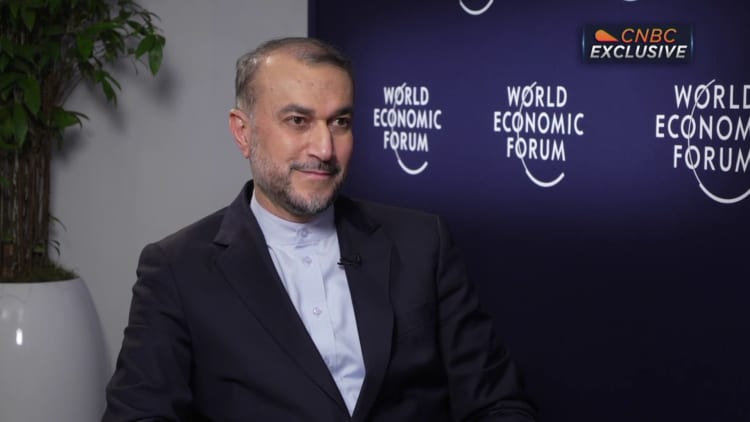Iran’s strikes around the Middle East send a message, analysts say
A man watches a news channel on television inside a shop after the Pakistani foreign ministry said the country conducted strikes inside Iran targeting separatist militants, two days after Tehran said it attacked Israel-linked militant bases inside Pakistani territory, in Peshawar, Pakistan January 18, 2024.
Fayaz Aziz | Reuters
Iran’s recent missile and drone strikes on targets in three countries — Syria, Iraq and Pakistan — may not have been directly related to Israel’s war in the Gaza Strip but they still revealed an intent to send a clear message, analysts told CNBC.
“While incitement against Israel is nothing new, its recent launch against ISIS in Syria of a solid-propellant medium-range ballistic missile capable of striking Israel from Iranian territory was a historic first and a message to the Jewish state,” Behnam Ben Taleblu, senior fellow at the Foundation for Defense of Democracies think tank in Washington D.C.
“Highlighting military power in the hopes of deterring adversaries has grown in importance for the regime as wars widen across the region.”
Within 24 hours starting on Jan. 15, Iran’s military forces struck what it alleged was an Israeli “spy center” in Iraq’s Kurdistan region, Islamic State targets in Syria, and militants in Pakistan that it said had carried out attacks on Iran. Iraqi and Pakistani ministers vocally criticized the attacks, calling them a “violation” and vowing consequences.

Pakistan responded a day later, striking targets inside Iran that Iranian authorities say killed several people.
While Iran’s actions in Pakistan and Syria were in response to domestic security concerns, the developments upped the intensity and risk of wider escalation in a region already mired in war since Israel began its offensive against Gaza in retaliation to a Hamas terrorist attack on Oct. 7, 2023. They were also the first time Iran had deployed its military directly at any time since the Israel-Hamas war began.
“No question, this is a tinderbox. The Middle East, it’s very dry and we’ve got a lot of sparks,” Ian Bremmer, CEO of political risk consultancy Eurasia Group, said during an interview at the World Economic Forum in Davos. “And I expect that this conflict is only going to escalate further.”
Iran funds and supplies forces in the region opposing Israel like Hezbollah in Lebanon, Hamas in Gaza, Shia militia groups in Iraq and the Houthis in Yemen — all of which are part of its regional proxy network and deterrence strategy as the so-called “Axis of Resistance.” These forces engage more directly with Israel and even the U.S.; Iran-backed Iraqi militias fire rockets at American military bases in Iraq and Yemen’s Houthis say they are in “direct confrontation” with the U.S. as they target shipping in the Red Sea in support of Gaza.
A ‘wider pattern’
Iranian leaders have said they do not want a wider war, but last week’s strikes served the purpose of both countering threats to its domestic security and demonstrating what it is…
Read More: Iran’s strikes around the Middle East send a message, analysts say
